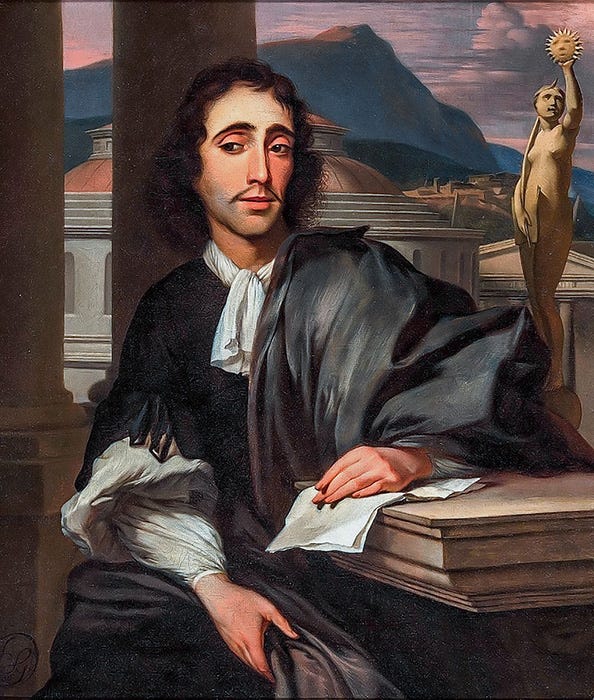Critiques of The Religious Authority
Baruch Spinoza
Baruch Spinoza (1632–1677) was a Dutch philosopher whose profound critiques of religious authority significantly shaped modern philosophy and ethics. Born into a Portuguese-Jewish community in Amsterdam, Spinoza’s ideas emerged during a time of intense religious and political upheaval in 17th-century Europe, marked by the Reformation and Enlightenment. His work laid the groundwork for secular ethics and rationalism, challenging traditional religious doctrines by arguing that true understanding of God—or Nature—could be achieved through reason and philosophical inquiry rather than through established religious practices.
Spinoza’s most notable contributions include his seminal work, Theological-Political Treatise, where he critiques the fusion of religion and state power, advocating for the separation of church and state and the freedom of thought. He contended that religious authorities often collude with civil powers to maintain control, stifling genuine spiritual inquiry and perpetuating superstition among the populace. His assertion that God and Nature are one, along with his rejection of a transcendent deity, positioned him as a pivotal figure in the shift toward a more secular and rational approach to ethics and governance.
The controversies surrounding Spinoza’s ideas stem from his radical rejection of traditional theological views, leading to his excommunication from the Jewish community and condemnation from various religious authorities. His emphasis on determinism and the naturalistic basis for ethical understanding was groundbreaking, challenging the foundations of religious morality by promoting a system where ethics arose independently of divine command. Spinoza’s legacy continues to influence contemporary discussions on individual liberty, rationality, and the role of religion in public life, marking him as a significant precursor to modern secular thought and Enlightenment philosophy.
Historical Background
The historical context in which Baruch Spinoza developed his philosophical ideas was characterized by significant social, political, and religious upheaval in 17th-century Europe. This period was marked by the English Civil Wars, which instigated intense political and social tensions as Parliamentarians clashed with Royalists, ultimately leading to the execution of King Charles I and the temporary abolition of the monarchy in England. These conflicts reflected broader trends of religious violence and strife across the continent, influenced by the Reformation and the subsequent wars of religion that played a crucial role in shaping European culture during the transition from the medieval to the modern era.
Spinoza, born in 1632 to a Portuguese-Jewish family in Amsterdam, was raised in a community steeped in religious tradition yet simultaneously exposed to the burgeoning ideas of Enlightenment thought. This duality influenced his intellectual development, leading him to question established religious doctrines and the nature of authority. His philosophical inquiries culminated in works such as the Theological-Political Treatise, where he critiqued the intertwining of religion and politics, arguing for the necessity of freedom of thought and the separation of church and state.
Moreover, the rise of print culture during this time played a significant role in disseminating new ideas and fostering public engagement with political and religious issues. Authors and printers published works that documented and interpreted the events of the day, shaping public perception and debate around religious wars and authority. Spinoza’s ideas emerged against this backdrop of rapid change, where the evolving landscape of knowledge and belief systems prompted a reevaluation of human existence, morality, and the divine.
Rationalism and Secular Ethics
Emergence of Secular Ethics
The violent religious wars that characterized early modern Europe catalyzed the development of secular ethics, highlighting the inadequacy of religious doctrines in providing a stable foundation for moral guidance. During the Enlightenment, philosophers began to confront the challenge of formulating ethical systems grounded in secular, naturalistic frameworks, marking a significant departure from the classical ethical systems that had dominated prior to the rise of Christianity. This transition was influenced by evolving understandings of nature and cosmology brought about by modern natural science, which rendered the Platonic and Aristotelian systems problematic in the Enlightenment context.
The Role of Rationalism
Rationalism, particularly as articulated by thinkers such as Gottfried Wilhelm Leibniz and later Christian Wolff, played a foundational role in the Enlightenment’s ethical discourse. Leibniz’s principle of sufficient reason posited that everything that exists has a reason for its existence, embodying the Enlightenment’s conviction that the universe is rationally intelligible. Wolff’s attempts to derive this principle from the logical principle of non-contradiction raised significant philosophical questions regarding the relationship between logic and substantive knowledge of reality.
Spinoza’s Influence
Baruch Spinoza emerged as a crucial figure in the development of secular ethics during the Enlightenment. His work, Ethics, presented a systematic rationalist metaphysics that rejected Cartesian dualism in favor of an ontological monism, wherein God and nature are identified as one substance with two attributes. Spinoza’s denial of a transcendent supreme being and his critique of traditional religious beliefs significantly contributed to the secular modernity that integrated philosophical, social, ethical, and political aspects. His ideas laid the groundwork for atheism and naturalism, emphasizing that ethical understanding can arise independently of religious authority.
Sapere aude! ‘Have courage to use your own understanding!’—that is the motto of enlightenment.
Immanuel Kant
Spinoza argued for a form of determinism grounded in naturalism, asserting that all events can be explained within the framework of nature and its laws, thereby excluding supernatural explanations. This naturalistic view aligned with the Enlightenment’s broader movement towards secular ethical frameworks, which emphasized reason and human agency over divine command.
Rationality in Ethics
For Spinoza, human freedom and ethical behavior are deeply connected to the possession of rational knowledge and adequate ideas.




